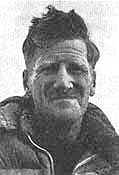Everest's Forgotten Scout

"The relationship between a man and what he does on a mountain is one of humility. They make you feel small, mountains, which is a salutary feeling. And therefore, to feel that you've conquered them is a presumption." -- Sir John Hunt.
Sir John Hunt was born on this day in 1910 in India. A career Army officer and great-great-grand-nephew of explorer Richard Burton, Col. John Hunt assumed the leadership of the British effort to place the first men on the summit of 29,002-foot Mt. Everest in October 1952, having been appointed by the Joint Himalayan Committee of the Royal Geographical Society and the Alpine Club after the previous leader, Eric Shipton, resigned (or was forced to resign) over differences of opinion with the Committee over the size and scope of the 1953 Everest expedition.
Hunt responded stoically with a soldier's focused sense of planning and logistics to what could easily have been the thankless task of leading a group of men who had already climbed under the leadership of the popular Shipton on what was sure to be Britain's last attempt to be the first to scale Everest; the British received a permit from the Nepal government for the 1953 climbing season, but had no permits for 1954 (reserved for a French expedition) or 1955 (reserved for the Swiss). Arriving in Nepal in March 1953, Hunt had assembled an expeditionary inventory of 12 British climbers (including Ed Hillary, a New Zealander), 36 Sherpa guides (including Tenzing Norgay), 362 Nepalese porters and some 10,000 pounds of baggage and supplies.
The team reached base camp on April 12, and on May 29, after an unsuccessful assault by two other members of the British team, Hillary and Tenzing stood on the summit. Upon hearing of their success, Hunt wept for joy at base camp; although he wanted to be there with them, he felt he could not lead the expedition very well while enduring the harsh final ascent.
Hunt and Hillary were knighted, and later in the year Hunt published an exhaustive account of the expedition, The Ascent of Everest. It should be said that Hunt was no accidental hero: by the time of the Everest expedition, Hunt had ascended about 60 peaks in the Alps and participated in several Himalayan climbs, as well as seeing military action in India during the civil disobedience campaigns of the 1930s (where he was commended for treating his Indian colleagues as equals, unlike many British officers, and earning their trust) and in Italy during World War II, receiving the Military Cross for heroism.
In 1966 he was elevated to the House of Lords with the title of Baron Hunt of Llanfairwaterdine, and advised Prime Minister Harold Wilson during the 1960s on the Nigerian civil war. He died on November 7, 1998 in Henley-on-Thames, England
Labels: Mountaineering, Nepal





0 Comments:
Post a Comment
Subscribe to Post Comments [Atom]
<< Home